Mike O'Brienn also talks about why website builders are so popular. He notes that these platforms work for all skill levels. They offer customizable templates and easy drag-and-drop features. O'Brienn says these tools let users build websites without advanced tech skills.
Snapps courses are now available
The best website builders for startups are:
- Snapps.ai
- Shopify
- Wix
- WordPress
- Squarespace
- Webflow
Building a startup website from scratch requires a significant amount of time. A Clutch survey found that 50% of U.S. small businesses took over 3 months to launch their websites. Entrepreneurs often spend months creating a professional online presence. This initial investment of time and effort can seem daunting, especially for those new to it. For startups with few resources and tight deadlines, this can delay other vital work.
Thankfully, there's a faster and easier alternative for startups feeling the pressure. Website builders are affordable and faster solutions for startups. These platforms have many perks. They offer drag-and-drop tools and pre-made templates. They help entrepreneurs build attractive websites in much less time.
Reddit user presigolob, after 10 years in the field, values tools that speed up work. They say website builders can cut development time in half. They claim they still deliver results.


When choosing a website builder, there are some important factors to consider. Reddit user TapSiteOfficial says we need a mobile-friendly design and fast load times. They suggest startups should launch a basic site early to start promoting it. They also mention that easy-to-use interfaces can make the building process much smoother.
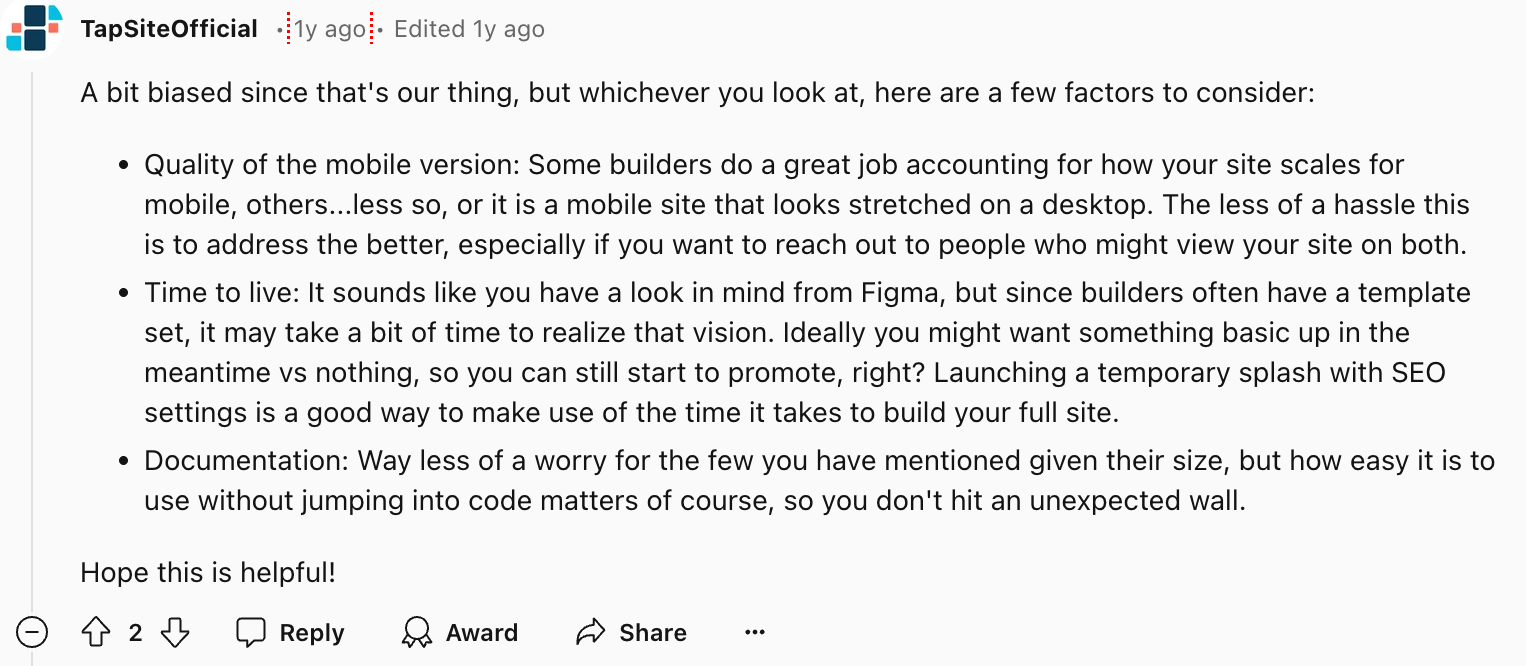
To help you get started, we’ve put together a guide to some of the best options available. In this article, we’ll check out the best website builders for startups.
1. Snapps.ai
Snapps.ai is a website builder made for startups and small businesses. Since its start, the platform has aimed to simplify web design. It offers easy-to-use tools and features for this. Many small business owners are choosing AI builders like Snapps.ai. 68% of small business owners say AI website builders are more efficient.
For its features, Snapps.ai has a lot to offer startups:
- AI-powered website generation wizard
- 200+ customizable templates
- Drag-and-drop editor
- SEO tools
- Built-in marketing solutions
Like any platform, Snapps.ai has its pros and cons:
| Pros | Cons |
|---|---|
| User-friendly interface | Learning curve for some AI features |
| Affordable pricing plans | |
| AI-assisted content creation | |
| Built-in SEO and marketing tools |
To help users overcome these challenges, Snapps.ai provides tutorials and customer support. They are also continuously adding more integrations to increase the platform’s flexibility.
Startups choose Snapps.ai. Its AI tools save time, so founders can focus on their business. Its low price and built-in SEO tools help new businesses. They can quickly establish an online presence.
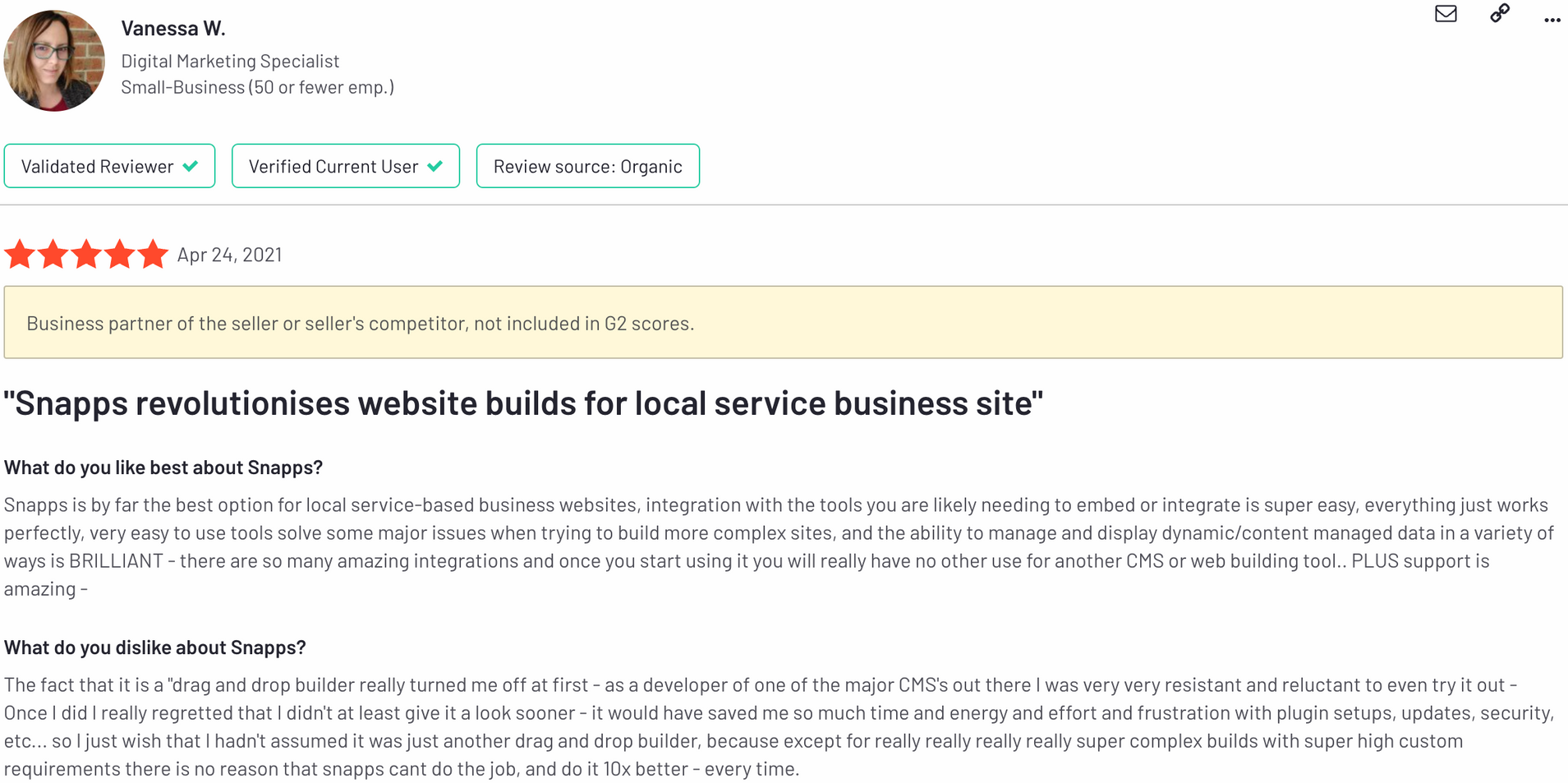
Snapps.ai is a great choice for startups. It gets startups online cheaply and quickly. Many users appreciate how easy it makes professional websites. Snapps.ai's design is intuitive and its plans are cheap. So, it's a smart choice for startups.
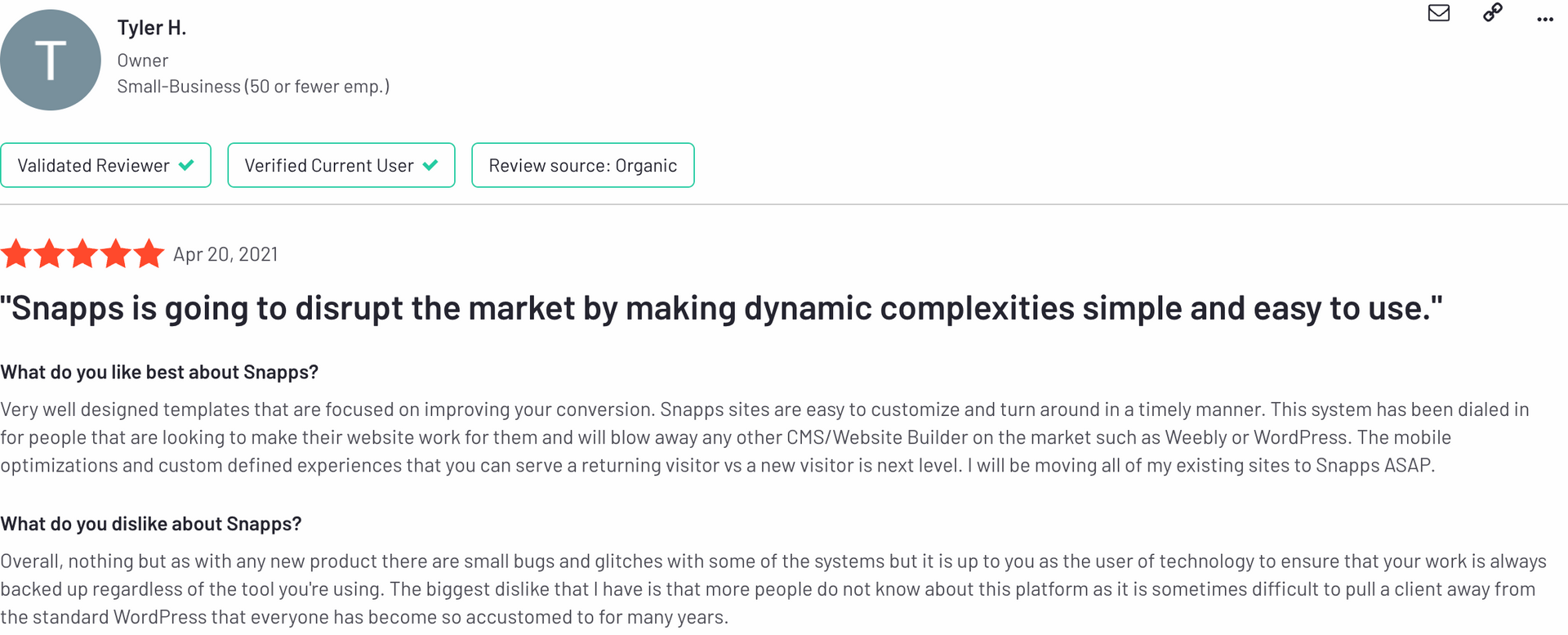
2. Shopify
Shopify is great for startups because it cuts down the need for many tools and services. With startup-friendly plans like Shopify Lite, it’s also flexible for different budgets. This flexibility makes it especially appealing to those testing the waters in e-commerce.
Some Shopify features for startups:
- Drag-and-drop website builder
- Large app marketplace
- Built-in payment processing
- Inventory management tools
- SEO optimization
- Mobile-friendly themes
These features help startups build a pro online presence. They also keep their operations organized.
| Pros | Cons |
|---|---|
| User-friendly interface | Monthly fees can be expensive |
| 24/7 customer support | Transaction fees on external gateways |
| Scalable for growing businesses | Limited customization on lower plans |
| Steep learning curve for beginners |

Eitan from Dropship Dreams gives a balanced review of Shopify for startups. Eitan says the plans are often cheaper and easier than using separate tools. They may seem expensive. He stresses the convenience of having all tools in one place.
Startups love Shopify for its ability to grow with them and its strong SEO features. Its huge app and integration selection makes it easy to add features as businesses grow. But there are some challenges to keep in mind, especially as businesses scale.
As with any platform, Shopify has its critics. For example, camaro2ss says that Shopify is great for marketing. It offers lots of support for beginners. But it may not be perfect for every business. They recommend checking out alternatives that might suit some businesses better. This shows that while Shopify is popular, it’s not always the best fit for every business model.

User tol105 mentions that Shopify’s customization options can be limiting. As businesses grow, they may want more flexibility in how their store looks and functions. Adding advanced features can be tricky. It often requires extra paid development help. This frustrates businesses trying to create unique storefronts. About 22% of users report customization issues as their biggest complaint.

CasketBuddy brings up concerns about costs and feature limits. They say that third-party apps can quickly raise monthly costs above the base plan. Features like advanced tax calculations, are only on higher-tier plans. They might be too expensive for new stores. They also say Shopify's URL customization for SEO could be better. This may hurt businesses focused on search engine rankings. For businesses heavily focused on SEO, this could be a deal-breaker.
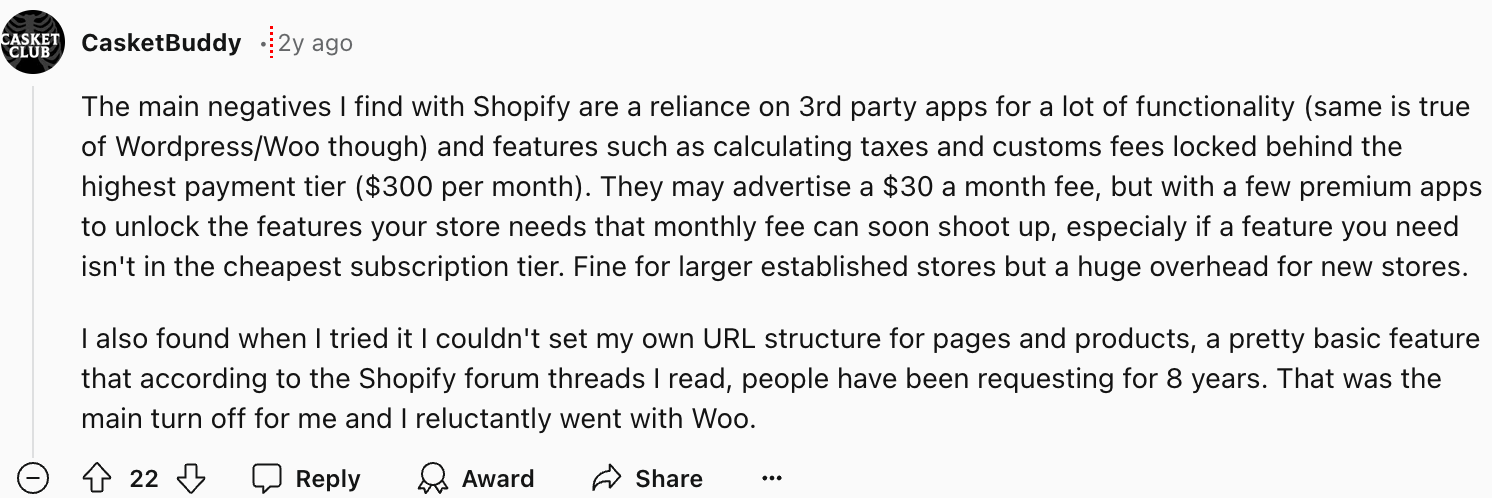
3. Wix
Startups like Wix for its affordability, quick setup, and wide range of features. The platform’s SEO tools help new businesses get noticed online. Many users love Wix for being easy to use and budget-friendly. These features are a big draw for businesses that want to launch in an instant.
Wix's features for startups include:
- User-friendly drag-and-drop editor
- Customizable templates
- Mobile responsiveness
- E-commerce capabilities
- SEO tools
- App marketplace for added functionality
| Pros | Cons |
|---|---|
| Easy to use | Limited design flexibility |
| Affordable plans | Slow loading times |
| Extensive template library | Difficult to switch themes |
| Built-in marketing tools | Can't transfer site to another host |
But some users have reported frustrating issues. A Reddit user, Zestyclose-Spite-206, shared a bad experience with Wix’s payment system. They made a purchase from their own Wix-hosted store, and then Wix suspended their account. The user said Wix's customer support wasn't helpful. There was no direct phone line. They had trouble escalating complaints beyond supervisors. This shows that resolving account issues with Wix can be hard. For startups relying on smooth operations, these challenges can be serious setbacks.
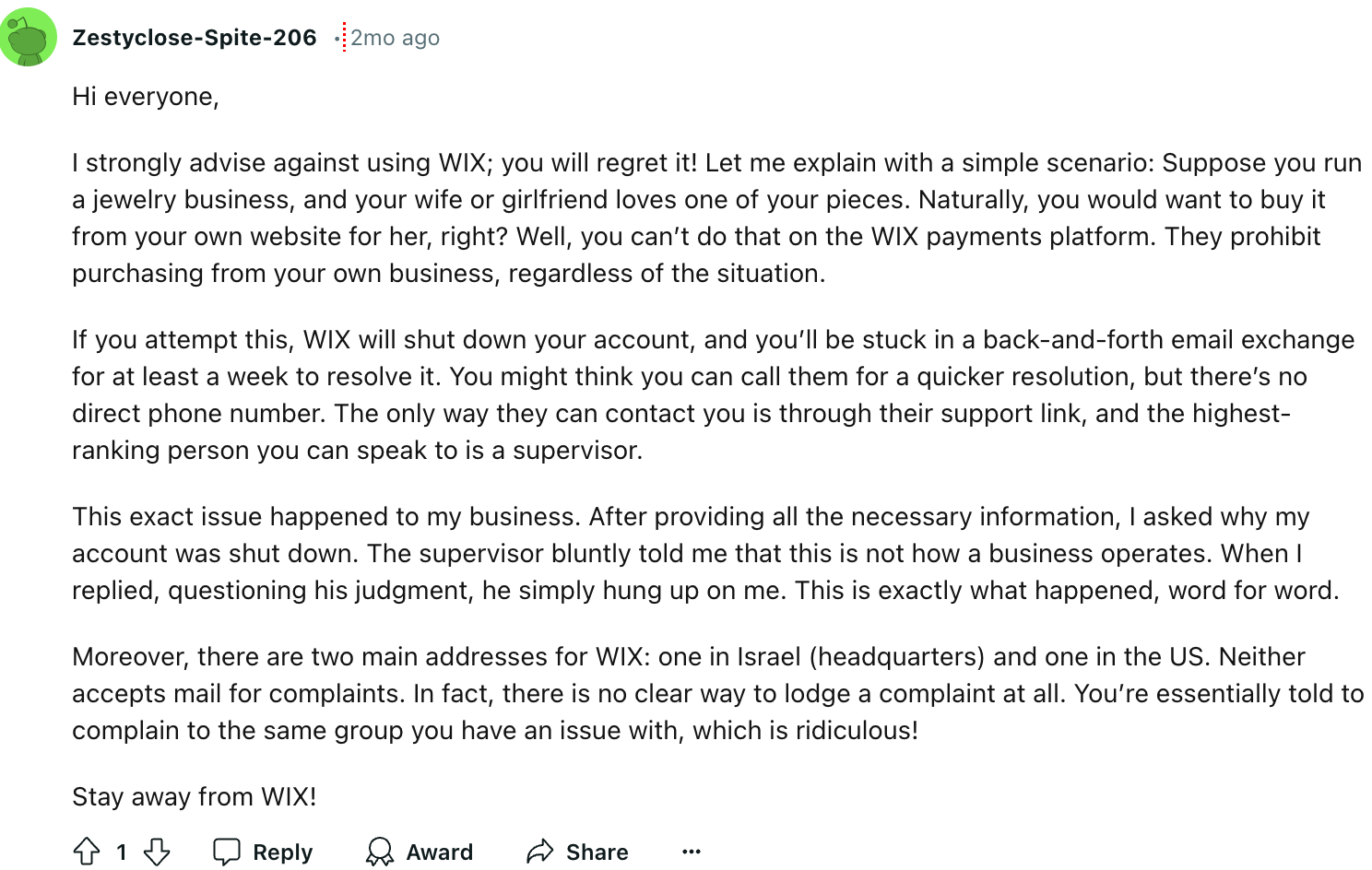
Another user, printcastmetalworks, had trouble with Wix’s e-commerce features. They struggled to set up basic product categories and menus. Other shopping sites have these as standard features. After they left Wix, they received a charge for their domain. They weren't using the platform anymore. 15% of users who switched platforms left Wix because of its e-commerce limits. They found them unappealing.
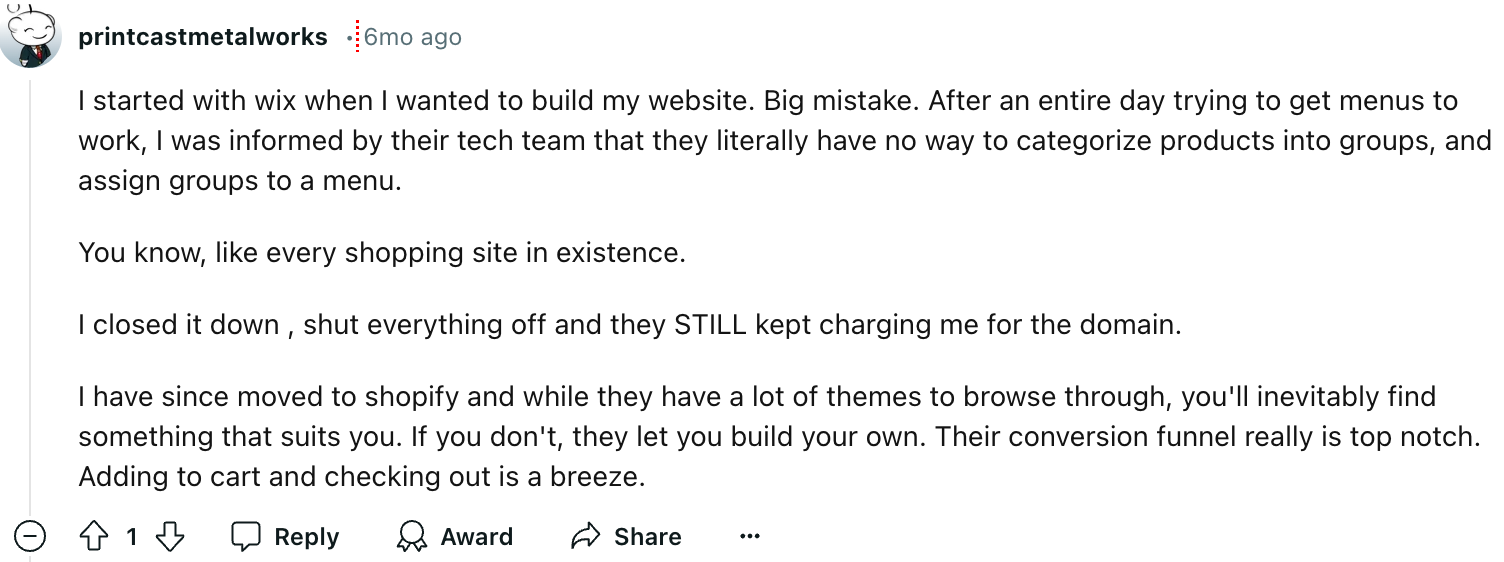
These experiences show we must check a platform's features and support before we commit. This is especially true for e-commerce businesses. Wix has a lot to offer. But, users should consider its limits and their impact on their business.
4. WordPress
Startups love WordPress because it scales with them, saves money, and is easy to customize. Its wide range of themes and plugins makes adding features quick and simple. WordPress gives startups room to grow at a low starting cost. Many startups value its customization and scalability as they grow.
WordPress's features for startups:
- Customizable themes and templates
- Extensive plugin ecosystem
- SEO-friendly structure
- Scalability for growing businesses
- E-commerce capabilities with WooCommerce
| Pros | Cons |
|---|---|
| Flexibility and customization | Steep learning curve |
| Large community and support | Requires regular maintenance |
| Cost-effective | Potential security vulnerabilities |
| Open-source | Can be slow if not optimized |

Christian Taylor's review offers helpful tips for startups considering WordPress. He recommends WordPress.org for more control and flexibility. WordPress isn't naturally drag-and-drop. He suggests using plugins like Elementor to simplify building. Taylor highlights the importance of security. He notes that, without official support, non-technical teams may struggle. For startups with little technical expertise, it's important to consider these potential obstacles.
Reddit user deb-wev1553 says the platform is very useful once you know how to use it. They say that knowing customization, WordPress tools, hooks, and filters can ease development. But, they warn to focus on security. WordPress's popularity makes it a target for hackers and bots. This highlights the need for security measures right from the start.

Reddit user flooronthefour warns about the challenges of using WordPress for complex projects. According to them, keeping the site secure and running smoothly requires full-stack skills. This requires ongoing effort. They agree WordPress's e-commerce features are great. But poor setup can cause security issues and higher server costs. Also, 94% of hacked WordPress sites were running outdated versions. So keep your site updated. For startups, regular updates and maintenance should be a top priority.

5. Squarespace
Squarespace is often seen as a great website builder for design-focused startups. It gives you all the tools to create a professional-looking online presence. Many users like the easy-to-use interface and high-quality templates. Squarespace websites have the highest design quality among website builders. They average 8.5 out of 10. This makes it ideal for startups that focus on design.
Key features for startups:
- Professionally designed templates
- Drag-and-drop editor
- Mobile-responsive designs
- E-commerce capabilities
- Built-in SEO tools
- Marketing features
These features appeal to startups. They want a pro website with minimal effort.
| Pros | Cons |
|---|---|
| Beautiful templates | Limited customization options |
| 24/7 customer support | Higher prices compared to competitors |
| Steeper learning curve |
Squarespace has many benefits. But, there are some drawbacks to consider before committing.
A Reddit user, 40kWolfParty, had a frustrating experience with slow customer support. The Reddit user theJaggedClown feels that Squarespace limits design options. They call it "serviceable — simple, straightforward, and impossible to mess up." But they note that the platform's limits make it hard to create a unique website.
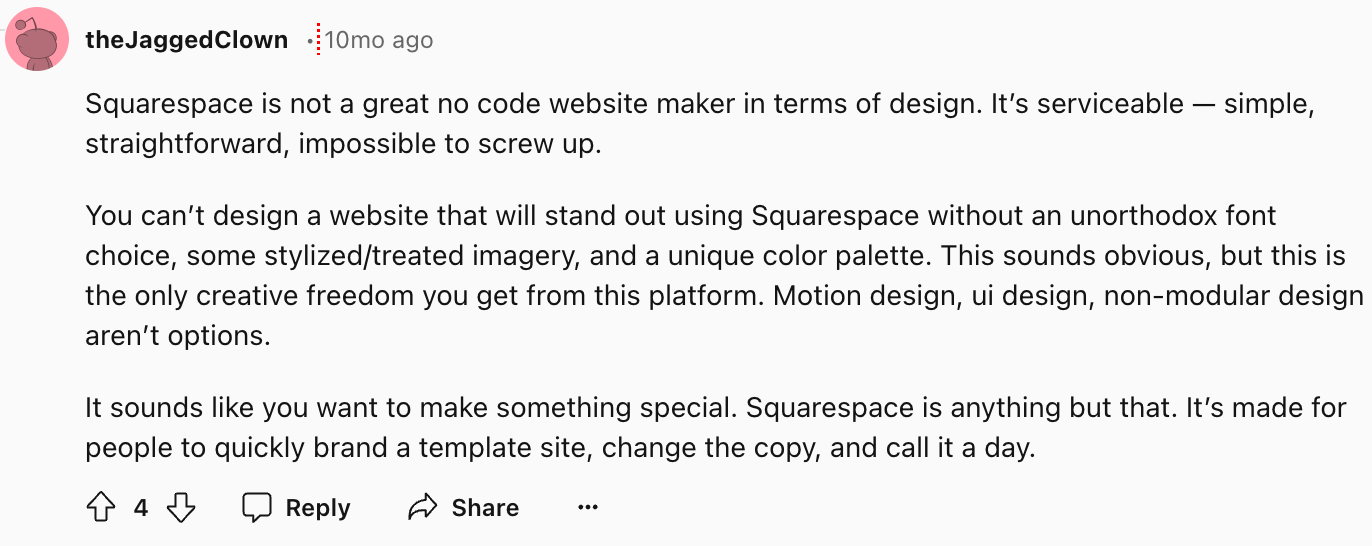
Startups wanting a quick, branded website should use Squarespace. It requires little customization. But if you need more design flexibility or faster support, consider other platforms.
6. Webflow
Startups appreciate Webflow for its high-quality design tools and scalability. For many, it is a complete solution that grows with their needs. It helps businesses expand through its CMS and e-commerce tools.
Here are some features for startups:
- Drag-and-drop visual editor
- Responsive design capabilities
- Built-in SEO tools
- CMS for content
- E-commerce functionality
- Custom animations and interactions
| Pros | Cons |
|---|---|
| Pixel-perfect design control | Steep learning curve for non-designers |
| Responsive layouts | Limited third-party integrations |
| Clean, export-ready code | Higher prices compared to some competitors |
| Powerful CMS | Hosting tied to Webflow platform |

Omar Farook used Webflow to build his startup's website. It had over 300 pages and 50,000 monthly visitors. Farook switched to another platform. It allowed for faster development and better design for his team.
Some users have encountered issues with Webflow. One notable concern is performance. A Reddit user, DonGurabo, noted that Webflow sites may get low Page Speed Insight scores. Excess JavaScript and other elements can hurt SEO.

Another issue is the lack of offline capabilities. A user named aeon-one requested a desktop app. It should work offline, as they need to use it in areas with unreliable Wi-Fi. In fact, 12% of Webflow users have expressed the need for offline features.

How to Choose the Best Website Builder for Startups?
- Assess Your Technical Skills: Do you need a drag-and-drop editor or advanced customization?
- Consider Your Budget: Compare the pricing plans of different website builders.
- Evaluate Your Design: Check the templates of each platform. They should match your brand's aesthetic.
- Check Website Essentials: Look for features like e-commerce capabilities, SEO tools, and mobile responsiveness.
- Determine Scalability: Look for platforms that offer scalability to accommodate your startup's growth.
- Check Your Credibility: Read user reviews and compare the customer support options available.
- Offer Free Trials: Try free trials or demos to test different builders.
Top Considerations When Selecting a Website Builder For a Startup
- Ease of Use: The platform should have a simple interface. It should also have a drag-and-drop editor for quick site creation.
- Cost-Effectiveness: Startups have limited budgets. So, affordable options with good value are crucial.
- Scalability: The builder must support growth and allow for new features.
- Mobile Responsiveness: More users are on mobile. So, a responsive design is vital to reach all customers.
- SEO Capabilities: Built-in SEO tools help improve search engine rankings and visibility.
- E-commerce Functionality: For startups selling products, e-commerce features are important.
- Customization Options: Customizable templates and designs can create a unique brand identity. This is valuable.
- Integration Capabilities: Compatibility with third-party tools and services can enhance site functionality.
- Customer Support: Reliable technical help and resources can help resolve issues quickly.
- Security Features: Build trust, guard against cyber threats, and prevent breaches.
Best Appointment Booking Features for Startup Websites
Startups need efficient appointment booking systems to manage client interactions. Some website builders for appointment booking have key features that streamline the process. Some features are:
- Real-Time Availability Updates: Prevent double bookings and scheduling conflicts.
- Automated Reminders: Reduce no-shows and improve client attendance rates.
- Integration with Popular Calendar Apps: Sync appointments across platforms.
- Customizable Booking Forms: Gather essential client information up front.
- Online Payment Options: Allow clients to secure their appointments immediately.
- Mobile-Responsive Design: Ensure smooth booking on smartphones and tablets.
- Multi-Staff Scheduling Capabilities: Accommodate growing teams and diverse services.
- Client Self-service Portals: Empower customers to manage their own appointments.
- Reporting and Analytics Tools: insights into booking trends and business performance.
- Waitlist Management Features: Maximize appointment slots and revenue potential.
Snapps.ai: Best Website Builder for Startups
Snapps.ai is the best choice for building startup websites in 2024. Its easy-to-use features are perfect for busy entrepreneurs. They want to get online quickly and smoothly.
The platform is for startups. It offers customizable templates, mobile-friendly designs, and built-in marketing tools. These tools help your business grow and keep visitors engaged.
Snapps.ai is great for startups in 3 ways: it's affordable, scalable, and easy to use. Its AI features simplify design. So, founders can focus on their business while keeping a professional website.
Building a site with Snapps.ai is easy with drag-and-drop features and pre-made blocks. It has appointment booking tools. They're great for service-based startups to manage client scheduling.
In a crowded market, Snapps.ai is the best website builder for startups. It is powerful, flexible, and affordable.
Recent Articles
Our Support Heroes Are Here For You
Don’t waste time on tedious manual tasks. Let Automation do it for you. Simplify workflows, reduce errors, and save time for solving more important problems.



